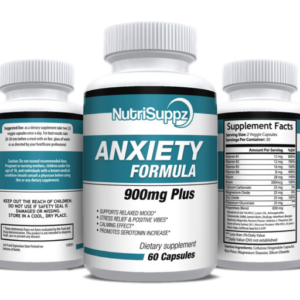30 Aug Managing Depression: A Holistic Approach
Managing Depression: A Holistic Approach
Depression is a pervasive and often debilitating mental health condition that affects millions of individuals worldwide. At Nutrisuppz, we recognize the importance of addressing this issue holistically, including the role of nutrition and lifestyle in managing and alleviating symptoms. This article aims to provide a comprehensive understanding of depression, its symptoms, causes, and potential nutritional and lifestyle interventions.
What is Depression?
Depression, also known as major depressive disorder (MDD), is more than just feeling down or having a bad day. It is a serious mental health condition characterized by persistent feelings of sadness, hopelessness, and a lack of interest or pleasure in daily activities. This condition can significantly impact one’s ability to function and enjoy life.
The symptoms of depression can vary widely but typically include persistent low mood, changes in appetite or weight, sleep disturbances, fatigue, and difficulties in concentration. It’s important to note that depression is not simply a result of personal weakness or a character flaw; it is a complex condition influenced by a combination of genetic, biological, environmental, and psychological factors.
Common Symptoms of Depression
Recognizing the symptoms of depression is crucial for seeking appropriate help. Common signs include:
- Persistent feelings of sadness or emptiness
- Loss of interest or pleasure in activities once enjoyed
- Significant changes in appetite or weight
- Sleep disturbances, such as insomnia or excessive sleeping
- Fatigue and decreased energy levels
- Feelings of worthlessness or excessive guilt
- Difficulty concentrating or making decisions
- Thoughts of death or suicide
These symptoms can vary in intensity and duration, and not everyone will experience all of them. It is essential for individuals who suspect they are suffering from depression to consult with a healthcare professional for an accurate diagnosis and appropriate treatment.
Causes of Depression
The exact cause of depression is not fully understood, but it is generally believed to result from a combination of factors. Genetic predisposition plays a role, as individuals with a family history of depression are at a higher risk. Biological factors, such as imbalances in brain neurotransmitters and hormones, also contribute to the development of depression.
Environmental factors, including stressful life events, trauma, or chronic stress, can trigger or exacerbate depressive episodes. Psychological factors, such as negative thought patterns and low self-esteem, also play a significant role in the onset and persistence of depression.
Nutritional Strategies for Managing Depression
Nutrition can significantly impact mental health, and certain dietary choices may help manage or alleviate symptoms of depression. Incorporating nutrient-dense foods into your diet can support overall well-being and mood regulation.
A balanced diet rich in omega-3 fatty acids, found in fatty fish like salmon, walnuts, and flaxseeds, has been linked to improved mood and reduced symptoms of depression. Similarly, foods high in antioxidants, such as fruits and vegetables, can help combat oxidative stress and inflammation associated with depression.
B vitamins, particularly B6, B12, and folate, play a crucial role in neurotransmitter function and mood regulation. Incorporating whole grains, lean proteins, and legumes into your diet can provide these essential nutrients.
Additionally, maintaining stable blood sugar levels by eating regular, balanced meals can help prevent mood swings and irritability. Avoiding excessive consumption of processed foods and sugar can also have a positive impact on mental health.
Lifestyle Changes to Support Mental Health
In addition to dietary changes, several lifestyle modifications can support mental health and help manage depression. Regular physical activity has been shown to boost mood, reduce stress, and improve overall mental well-being. Aim for at least 30 minutes of moderate exercise most days of the week.
Adequate sleep is crucial for mental health, so establishing a consistent sleep routine and creating a restful sleep environment can help improve sleep quality. Stress management techniques, such as mindfulness, meditation, and deep breathing exercises, can also be beneficial in reducing symptoms of depression.
Building and maintaining strong social connections can provide emotional support and reduce feelings of isolation. Engaging in meaningful activities and hobbies can help restore a sense of purpose and pleasure in daily life.
Seeking Professional Help
While dietary and lifestyle changes can be beneficial, they should not replace professional medical treatment. If you or someone you know is struggling with depression, it is important to seek help from a mental health professional. Therapy, counseling, and medication may be necessary components of a comprehensive treatment plan.
If you experience thoughts of self-harm or suicide, seek immediate help from a healthcare provider, crisis counselor, or emergency services. Remember, depression is a treatable condition, and support is available.
Managing Depression: A Holistic Approach
Conclusion
Understanding depression and its multifaceted nature is crucial for effective management and recovery. At Nutrisuppz, we believe in a holistic approach to mental health, integrating nutrition and lifestyle practices to support overall well-being. By making informed choices and seeking professional guidance, individuals can take proactive steps toward managing depression and improving their quality of life.




No Comments